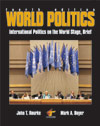Imagine that you are the U.S. (or British, Chinese, French, Indian, Pakistani, or Russian) president (or prime minister). You are absolutely convinced that an enemy is about to launch a major nuclear strike. What do you do? You can wait and pray; you can surrender; you can contact the other country's leader on the telephone. If you call, though, isn't the other leader likely to just deny your accusation? Moreover, if you call, you tip them off and eliminate your chance of a preemptive, damage-denial strike? Perhaps you should strike first (LOW) to destroy as many enemy missiles as possible, thereby hoping to limit the damage to your country. You will have greater confidence that you are not inadvertently starting a nuclear war if you wait until the enemy actually launches their missiles (LUA), but then those missiles will certainly devastate your country and your counterstrike will only have the effect of "taking them with you." Or you can be sure that you are not mistakenly starting a nuclear war by waiting until the strike actually hits your territory and forces (LOI), but your ability to counterstrike may be diminished or obliterated. But, then again, what do you gain by retaliating at that point, anyway?
Click here to begin |



 2002 McGraw-Hill Higher Education
2002 McGraw-Hill Higher Education